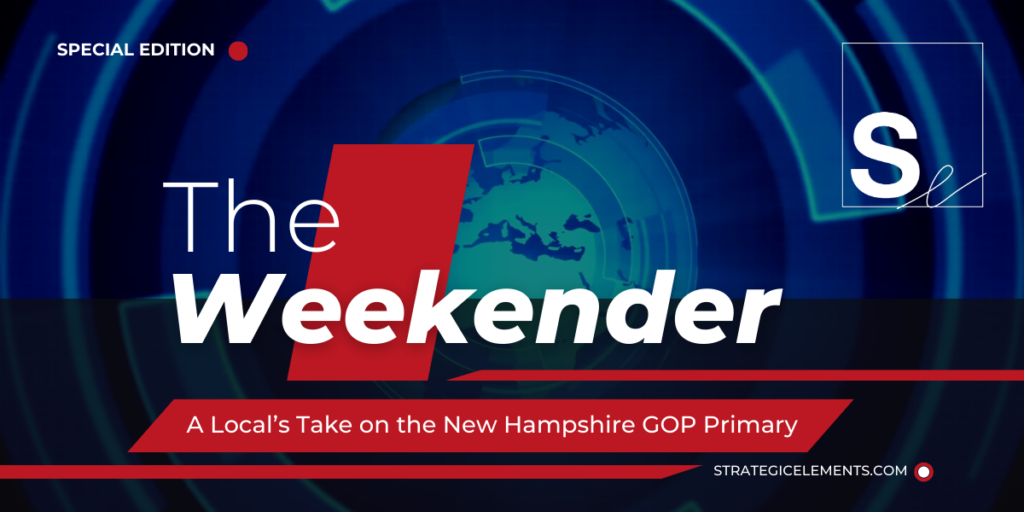DATA POINTS
- 1: The number of minutes after the polls closed before the media called the race
- 9: The number of counties won by Donald Trump (out of 10)
- 11.1%: Donald Trump’s margin of victory in the NH Primary
- 43: The percentage of voters in the NH Republican primary who identify as Independents
- 45.7%: The percentage of NH Republican primary voters who voted for someone other than Donald Trump
- 140,101: The number of ballots cast for Nikki Haley
- 176,040: The number of ballots cast for Donald Trump
- 323,166: The number of total votes cast in the Republican primary breaking the previous record set in 2016
- $30 Million: The amount spent by Nikki Haley’s campaign and main super PAC in New Hampshire
Guest Perspective
A Local’s Take on the New Hampshire GOP Primary
New Hampshire: ‘First in the Nation’ Primary Proved it’s Mettle
New Hampshire has been the ‘First in the Nation’ Primary since 1952. It is a primary that has been known to produce some big surprises, largely because the state has more registered “undeclared” (or independent) voters than registered republicans or democrats. George H. W. Bush beat Bob Dole in 1988, John McCain beat George W Bush in 2000 and Donald Trump beat Ted Cruz in 2016 – all after losing to the other candidate in Iowa. On election day, undeclared voters can choose either a republican or a democrat ballot. However, a republican cannot vote in the democrat primary nor vice versa.
The 2024 republican primary was always going to be a monumental challenge for a candidate to wrest control of registered republican primary voters from former President Donald Trump in New Hampshire, and in every state for that matter.
In the well-respected Emerson College poll back on March 5, 2023, Trump was beating his next closest competitor, Governor Ron DeSantis among registered Republicans 66%-13% in the Granite State. At the time, DeSantis was much closer among registered independent voters only losing to Trump 36%-29%.
Let’s fast forward to December. Governor Ron DeSantis is on the ropes. Trump has solidified his support among registered Republicans and, among all primary voters, is polling at 60-65% nationally and around 50% in Iowa and New Hampshire. However, with Trump hanging around 50%, it emboldened the other candidates who believed they could find a way to cobble together 51% of the vote either in Iowa or New Hampshire which would theoretically propel their candidacy across the country.
Once Iowa Governor Reynolds endorsed Ron DeSantis on November 6, luring him to focus on Iowa, it became clear that Nikki Haley was going to make her stand in the Granite State.
Haley didn’t have many staff on the ground in New Hampshire, but she had campaigned the way little known candidates have found success before. Starting her campaign at 4% in the polls, she visited two to three days at a time, every other week, holding town hall meetings in different regions of the state, and working overtime to get the endorsement of Governor Chris Sununu.
Haley’s image among republican and independents peaked in December. She didn’t have as good an image as Trump among registered republicans, but it was a solid 66% favorability in the St. Anselm College poll.
On December 12, Governor Chris Sununu endorsed Nikki Haley, seemingly giving her the ultimate boost in New Hampshire’s ‘First in the Nation’ primary. And it marks the unofficial start of the ‘stretch run’.
The Trump Advertising Onslaught
Donald Trump did what he does so well, relentlessly going after his newest threat with a barrage of attack ads using Nikki Haley’s own words against her. On December 19, Trump unloaded on Haley, with an ad titled “High Tax Haley”, for proposing an effort to raise the gas tax after promising not to just two years earlier. That proposal she supported included reducing other taxes but the fact remains that she went back on her promise. Haley never directly responded to the ad which allowed it to sink in with voters day after day.
On January 8, Trump launched and ever tougher attack on the immigration issue, again using Haley’s own words about illegal immigrants: “we don’t need to call them criminals, they’re not.” That Trump ad lambasted her on the number one issue among Republican voters. Again, Nikki Haley had no response other than “Trump lies” and offering no proof that the ads were false.
By staying mostly silent, those two ads decimated Haley’s GOP image leaving her only one path to gain support in New Hampshire: independents.
The Televised New Hampshire Debates
On January 15, Haley comes in third place in the Iowa caucus and claims that it’s a two-person race, thereby setting the stage for the final week of the New Hampshire Primary.
As in Iowa, there is tremendous history that comes with New Hampshire’s televised debates, in particular, the one hosted by WMUR-TV. Voters have come to expect and rely on the New Hampshire debates as they almost always deliver a defining moment. In fact, many will forever remember the 2016 blow that Chris Christie dealt Marco Rubio characterizing him as a robot who memorizes 25 second scripts instead of speaking with authenticity. That exchange effectively halted a surging Marco Rubio who was polling in second place. On election day, Rubio finished a distant fifth.
This year, Nikki Haley made public her decision to skip New Hampshire’s debates before she even arrived in the state from Iowa. As she left Iowa for New Hampshire, Haley tells the media that she will not join in the debates unless Donald Trump participates. Of course, everyone knew Trump would not participate. Her rationale may have made sense on the surface, but she gained prominence by participating in all the prior debates, and according to the recent January St. Anselm University poll, she is behind 45%-31%.
This unforced error squandered an enormous opportunity to persuade late deciding republicans and independents in the final week. The decision also took a direct hatchet to WMUR-TV, New Hampshire’s only statewide television station.
Town Hall Events
New Hampshire prides itself on Town Hall events where voters are invited to a public meeting with the candidate and after a short opening speech, the audience asks their questions. The Town Hall question and answer period helps voters get to know a candidate, but it also prepares a candidate for the debate stage and for interaction with the media. It’s a win-win format.
Vivek Ramaswamy, Chris Christie and Nikki Haley all implemented some form of this strategy early in their campaign with great success. But it was Nikki Haley who came back regularly, two to three days at a time throughout the Fall months, to build some momentum on the ground. As Haley’s stock rose from solid debate performances, voters at Town Hall meetings were able to connect with her on a more intimate basis.
Her early success is what made Haley’s decision to shift away from Town Hall meetings in the final week of the campaign so mystifying. At a time when voter interest is at its highest, Haley could have directly engaged thousands of voters on the ground, show a more human side to her candidacy in the final days, and created a needed buzz in hopes of igniting a firestorm of momentum across the state.
Fair or not to the other candidates, Donald Trump discovered a campaign rally format years ago that he has made famous and works very well for his style. However, in the New Hampshire primary, the Trump campaign format is more of an anomaly than a traditional and successful approach.
Governor Ron DeSantis stated publicly during the final week of his campaign that he made a mistake not opening himself up to questions at town hall style events on the trail early on. It is an area where he grew much more comfortable, albeit it too late.
State and Local New Hampshire Media
As always, New Hampshire’s state and local media was aching to cover the New Hampshire primary. The beauty of the local media in the state is that they will generally bend over backwards to get the opportunity to meet and interview presidential candidates in the final months of the campaign. And during the final week, you can count on them to get your message out. The state and local media love what they do, and they cherish New Hampshire’s ‘First in the Nation’ Primary because it gives them the same satisfaction that everyone else in the state appreciates: a unique opportunity to be part of the national political stage. They are among the biggest primary supporters in the Granite State.
In the final week, a campaign should be inviting state and local media in the campaign vehicle or bus, while setting some ground rules, but opening themselves up in a personal way that could generate positive earned media in the final days. Of course, this concept should not be limited to state and local media, but it must be the priority given that the campaign should be focused on New Hampshire rather than the nation.
Once again, this was a lost opportunity for Nikki Haley. In addition to offending WMUR-TV, many reporters couldn’t get calls returned from the Haley campaign in the final week.
A successful campaign must utilize state and local media resources in the final months, weeks, and days to get out their candidate’s message, but also to help the media see a different side of the candidate. It all works together to build momentum when you need it most.
The Trump Juggernaut and The Result
Yes, Donald Trump does not run a “traditional New Hampshire campaign.” He would benefit from some of the tactics, but given his passionate voter base, much of it would be difficult to accomplish. Not to mention, it would be somewhat impractical with the addition of Secret Service protection.
However, his state operation was a true juggernaut and much stronger than in 2016 or 2020. They were on the ground early and they had an army of committed volunteers who would run through walls for the former President.
New Hampshire’s Victory
When Nikki Haley’s momentum peaked in the middle of December, the week after the Sununu endorsement, a St. Anselm College poll put the race at 44-30. Haley was only 14 points out against a popular former President and in a position to succeed because she ran a New Hampshire campaign the way voters expected.
Haley might have even shocked the nation if her final weeks had been like the rest of her campaign, but we will never know how those missed opportunities would have impacted the outcome.
Haley netted only 3 points over the stretch run with the final result being a resounding victory for the former President, 54.3% to 43.2%.
More importantly, 2024 produced a memorable campaign that showed America the ‘First in the Nation’ primary successfully served its great purpose once again.
(Mike Dennehy is a republican strategist based in Concord, NH. He was the New Hampshire campaign manager for Sen. John McCain’s presidential campaign in 2000 and a senior advisor for McCain in 2008. His company is www.DennehyBouley.com.)
Trump the Unifier?

This time around, Trump was able to pull 90% of the 2016 Cruz/evangelical vote in New Hampshire and Iowa, largely from rural areas. While the moderate Kasich and Rubio voters mostly picked Nikki Haley in their ballots, they did not vote as a bloc. In fact, Trump picked up more than one-third of the 2016 moderate vote in New Hampshire this year. Trump also kept about 75% of his 2016 Iowan fandom, although 20% defected to Haley in this matchup.
TLDR: Trump is stronger in 2024 than he was in 2016. The crowded 2016 field helped him rise above his competition; this year, he took most of their votes for his own. With only Nikki Haley standing in his way (ignoring legal troubles), is there a path for her to take votes away from him after he’s already won Iowa and New Hampshire?
Read More at The Washington Post
What’s next for Nikki?

Trump is currently the Republican king of the hill, and he will do everything in his power to make Haley’s campaign more difficult. The former president started a “birther” conspiracy theory that falsely questions Haley’s POTUS eligibility. (Fact check: She was born in South Carolina.) He also claims that her supporters are largely Democrats.
As Trump persists in his attempt to take her down, Haley has told her supporters that “this race is far from over.” She has continually fired attacks back at Trump, from insulting his age to questioning his intelligence, while maintaining the support of many former Trump supporters. But if she continues to ride in second place, how long will she last? That said, August is a long time from now, and a lot can happen. If Haley sticks in the race, she may be able to capitalize on a theoretical seismic shift in the race. Of course, she will need the donors to stick with her to pull that off. Time will tell.
Read More at The New York Times
Beat Biden by Biting the Bullet

Trump may be a hard pill to swallow for many Republicans, but, in their eyes, he is a better choice than President Biden to have in the Oval Office. The most recent wave of Trump endorsements proved it – they focus on beating Biden rather than having their favorite candidate in the race. Iowa and New Hampshire have offered Trump momentum heading into the primary contests, regardless of his endorsements.
The end of the DeSantis Dream, but not the DeSantis Digs

DeSantis, either emboldened or embarrassed by his loss, acted as though more than his presidential campaign was defeated in Iowa. When asked if he would consider running for president again, DeSantis said he may, “if we have a country left by 2028.” Clearly, he does not find optimism in another four years of a Trump or Biden presidency. Interesting, to say the least, because he endorsed Trump for another term.
Biden’s Write-in Campaign
While the Trump/Haley New Hampshire battle consumed most of the airwaves surrounding Tuesday’s primary election, President Biden took the W in the Granite State through a write-in campaign. That’s right… the sitting president’s name did not appear on the ballot.
Why? In 2023, the Democratic National Committee decided South Carolina would be the first to host a contest in the DNC primary in 2024 and declared that any states that facilitated elections prior would not be eligible to accrue delegates at the national convention. New Hampshire, whose state constitution mandates them to hold the first-in-the-nation presidential primary, proceeded anyway – but their future delegates to the DNC were protected because Biden’s name did not appear on the ballot.
That brings us to this week, where Biden loyalists launched an unofficial write-in campaign, turning out nearly 80,000 votes – 63.9% of votes cast – all while Biden campaigned in Virginia. (He hasn’t been to New Hampshire since 2022.) These votes – and the victory – will yield Biden zero delegates, but perhaps it will provide a breeze at his back and an uptick in enthusiasm surrounding his take-two for 1600 Pennsylvania.
Be sure to follow us on Facebook, Twitter, and LinkedIn for more news and industry updates. To receive a copy of The Weekender in your inbox, sign up here.







